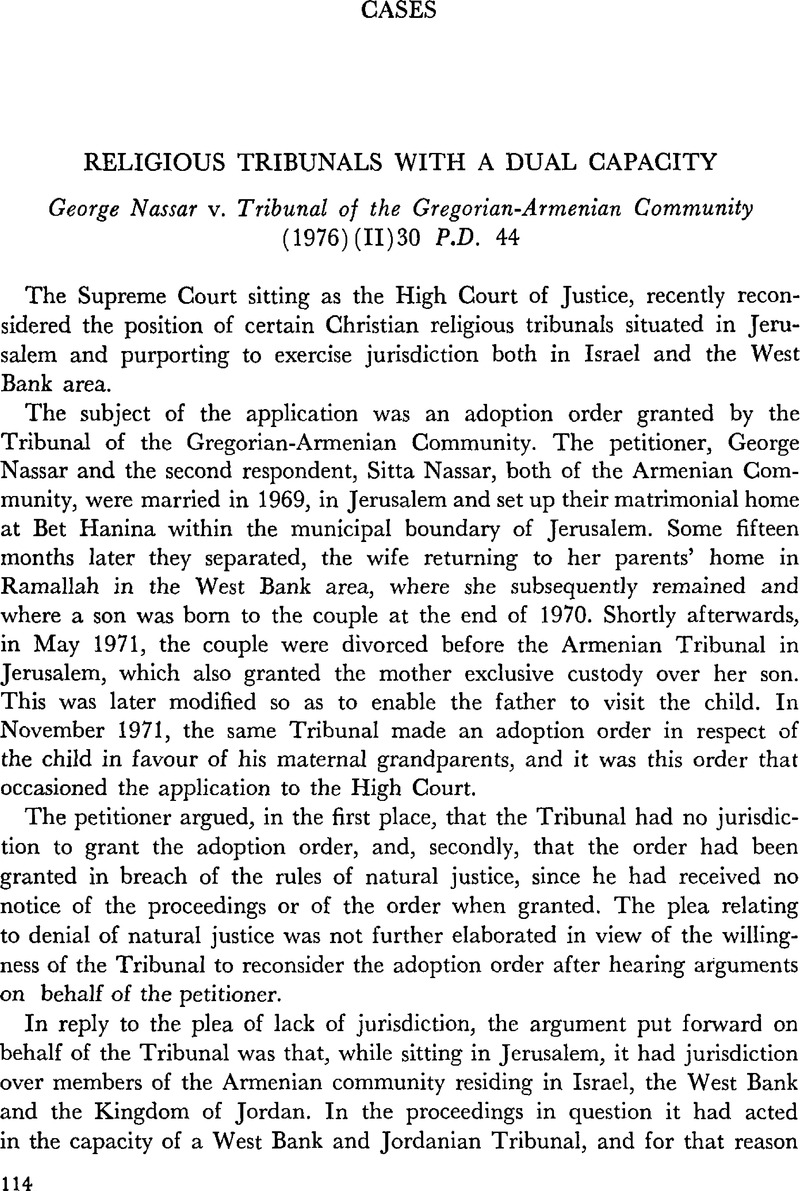No CrossRef data available.
Article contents
Religious Tribunals with a Dual Capacity
Published online by Cambridge University Press: 12 February 2016
Abstract

- Type
- Cases
- Information
- Copyright
- Copyright © Cambridge University Press and The Faculty of Law, The Hebrew University of Jerusalem 1977
References
1 (1960) 14 L.S.I. 93.
2 “Resident” is a translation of the Hebrew term toshav which is not defined, but should be understood in the context of the term moshav, as defined, for example in the Legal Capacity and Guardianship Law, 1962, sec. 80 as the centre of a person's life. It is thus closer to domicile than to residence.
3 See Dicey, & Morris, , Conflict of Laws (9th ed., 1973) 469Google Scholar; Cheshire, , Private International Law (ed. North, , 9th ed., 1974) 464.Google Scholar
4 Recueil des Conventions de La Haye (1973) 64; (1965) 14 I.C.L.Q. 55.
5 As of October, 1976, the Convention had only been ratified by Austria and Switzerland and signed but not ratified by the United Kingdom. A minimum of 3 ratifications is required.
6 Adoption Act, 1968, the jurisdictional provisions of which have, however, not yet been brought into force.
7 This term is used in a number of Hague Conventions on private international law. Being a less technical concept, it is more universally acceptable than domicile.
8 Restatement of the Law Second, Conflict of Laws 2d. (1971) vol. 1, p. 235.
9 (1957) 11 L.S.I. 157.
10 (1969) (I) 23 P.D. 260.
11 (1965) 19 L.S.I. 58.
12 Oppenheim, , International Law (ed. Lauterpacht, , 8th ed., 1955) vol. 1, p. 326.Google Scholar
13 Vitta, E., Personal Status in Palestine (1947) 115.Google Scholar
14 See synopsis by Brownlie, I., Principles of Public International Law (2nd ed., 1973) 301.Google Scholar
15 Drayton, , Laws of Palestine vol. 3, p. 2582Google Scholar as amended by P.G. 1939 vol. 2, p. 463. See also E. Vitta, op. cit., at p. 120.
16 See Paton, , Jurisprudence (4th ed., 1972) 222Google Scholar where the view is apparently taken that the House of Lords, at any rate after its 1966 declaration, is capable of overruling its own decisions.
17 11 L.S.I. 157.
18 See Bella Isaac Shik v. Minister of the Interior (1972) (II) 26 P.D. 33, and in particular the following passage quoted with approval by Agranat P. at p. 43, from the judgment of Silberg J. in Belan v. Executors of Will of the late Raymond Litwinsky (further hearing) (1960) 15 P.D. 71,75:
“Section 33 (b) [of the Courts Law] merely attenuates somewhat the binding force of precedent but does not abolish the doctrine entirely. The Israeli legislator did not wish to free the Supreme Court entirely from the binding force of precedent, thereby allowing every judge to act on his own initiative with respect to the numerous rules laid down after research and labour in earlier judgments…”
Agranat P. quotes from English sources to show that in England also, even after the 1966 declaration of the House of Lords, although in appropriate cases it will not regard itself bound by previous decisions, stability and substantial conformity with previous decisions still prevails in the majority of cases.


